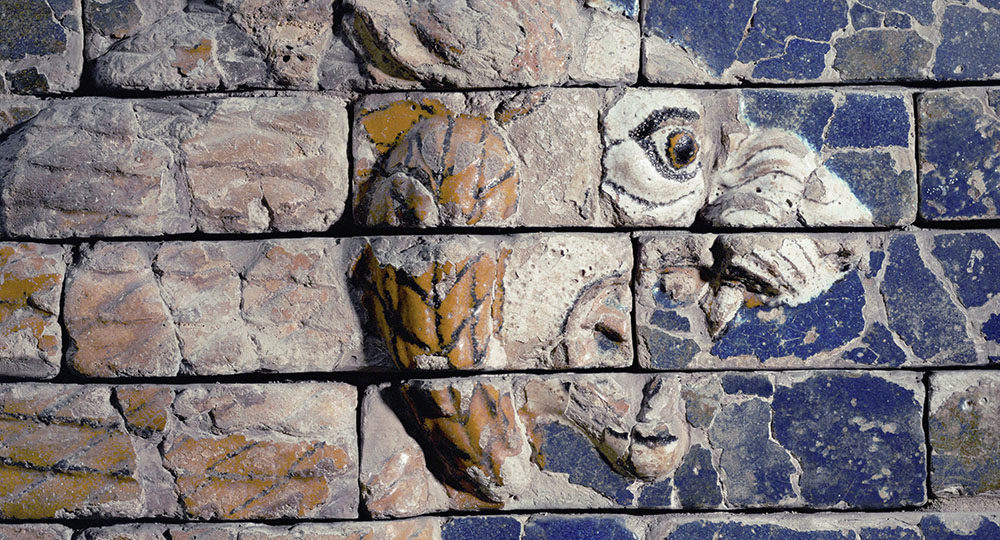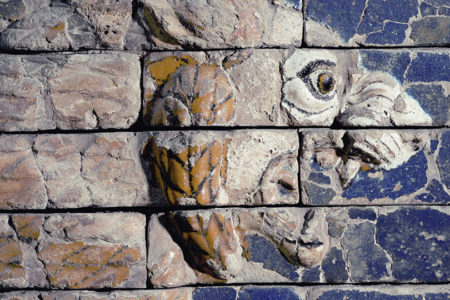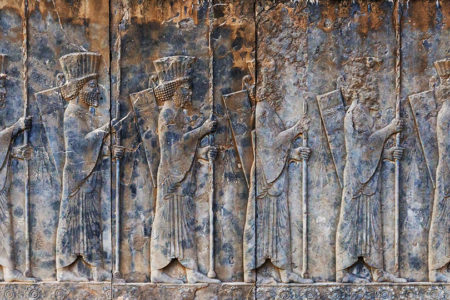The Babylonian Captivity
The pivotal events in the Old Testament history of the Israelites are the destruction of Jerusalem in 586 B.C. by the Babylonians and Judah’s subsequent captivity in Babylon.
How could these tragedies have happened to God’s people? How could the Davidic kingship be cut off? How could the Temple, indwelled by the Lord Himself, be destroyed?
The issues surrounding Judah’s destruction are central to the Lord’s relationship with Israel and take us from history to theology. They involve the Abrahamic, Davidic, and Mosaic Covenants, namely, Judah’s disobedience to the Mosaic Covenant and the Lord’s faithfulness to the promises He made to Abraham and David.
Reason for the Captivity
When Israel was established as a nation under the Mosaic Covenant at Mt. Sinai, it entered into a treaty with the Lord modeled after a Hittite treaty form called a Suzerain-Vassal Treaty. Hittite kings used this treaty form when they subjugated smaller nations. The king would promise to protect the vassal nation in exchange for a promise of loyalty and tribute.
The book of Deuteronomy is structured like such a treaty. The Lord promises to protect and dwell personally with Israel if it will be loyal to Him alone (keep the Ten Commandments and Mosaic Law) and give Him tribute, such as sacrifices of worship.
As in a Hittite treaty, there are consequences for the vassal’s disloyalty. In Israel’s case, the cursings of the covenant, listed in Deuteronomy 28:15–68, were the legal consequences.
Unfortunately, the Old Testament reveals that Israel continually broke the Mosaic Covenant, thus obligating the Lord to discipline the nation with the curses. But despite this discipline, the Lord always preserved a remnant of Israelites because He also had made unconditional promises to Israel through the Abrahamic (Gen. 12; 15) and Davidic (2 Sam. 7) Covenants. The Old Testament is really the story of the interplay and relationship of God’s dealing with Israel based on these covenants.
During the reign of Solomon’s son Rehoboam, the Jewish nation split in two. Jeroboam took the ten tribes in the north and founded the northern kingdom of Israel. But Jeroboam also established idolatry, setting up golden calves at Dan and Bethel and calling his people to worship them as “the Lord.” The prophets Elijah, Elisha, Hosea, Amos, and others all warned Israel of the consequences of breaking its covenant with God, but to no avail. Samaria (northern kingdom) was destroyed in 722 B.C. by Sargon V, king of Assyria; and the Assyrians transported other peoples to Israel to create a mixed population known later as the Samaritans (2 Ki. 17).
Judah should have known the consequences of breaking the Mosaic Covenant after what happened to the northern tribes. Judah was warned. God kept His promise to David that, despite evil kings in Judah, the Davidic kingship would be preserved. Finally King Manasseh, Hezekiah’s son, was so evil, practicing child sacrifice in the Hinnom Valley, that God proclaimed judgment on Judah (2 Ki. 21:1–18).
Isaiah had already prophesied that Babylon would plunder Jerusalem after Hezekiah had shown all his treasures to the Babylonians (2 Ki. 20:12–21). Judah had failed to repent. Its judgment was certain. King Josiah’s revival postponed the destruction for a time, but God’s Word would stand (2 Ki. 22:1—23:27).
The First Deportation (605 B.C.)
Judah’s initial deportation was a part of the larger geopolitical battles of the seventh century B.C. The Assyrian Empire, which had ruled the Middle East for more than a hundred years, was disintegrating. A coalition of Medes and Babylonians rebelled in the east and by 612 B.C. had sacked Nineveh. The Assyrian army retreated to Haran to try to stop the invading Babylonians.
In 609 B.C. Pharaoh Neco II of Egypt and his army attempted to reinforce the Assyrians but was met by King Josiah at Megiddo, who then died in battle (2 Chr. 35:20–27). The Babylonians were again victorious; and after a final battle at Carchemish in 605 B.C., the entire land of Israel came under Babylonian hegemony.
After Josiah’s death, his son Jehoahaz became king but lasted only three months. Pharaoh Neco, on his return from the battle of Haran, deposed Jehoahaz and installed Jehoiakim his older brother as king. Jehoiakim, a vassal of Egypt, was ruling when Babylon’s King Nebuchadnezzar expelled the Egyptians and brought Judah under Babylonian rule in 605 B.C. with a pledge of Jehoiakim’s loyalty to Babylon.
As was the custom and, in part, to ensure loyalty, Nebuchadnezzar took the sons of the Judean nobility to Babylon as hostages, seeking to employ them in his service. Included in this initial deportation were Daniel and his friends (Dan. 1:1–7).
As the book of Daniel indicates, these young hostages were not mistreated but pampered in an attempt to induce them to adopt Babylonian culture so as to better serve Babylon. Daniel’s test was how to truly serve God and Nebuchadnezzar at the same time.
Through God-given wisdom, he did so first by declaring he would follow God’s law (Dan. 1) and then by proving himself a valuable asset to the king through the gifts God had given him (Dan. 2).
God revealed to Daniel that Babylonian rule was the beginning of the Times of the Gentiles (Dan. 2, 9) under which Judah would have to learn to live until its ultimate restoration in a future-Kingdom.
The Second Deportation (597 B.C.)
After three years of loyalty to Babylon despite heavy taxes, Jehoiakim rebelled. Initially, the Lord afflicted Judah by sending neighboring countries against it. Then Nebuchadnezzar came again. He had Jehoiakim bound in chains and the Temple robbed of its treasures (2 Ki. 24:1–5; 2 Chr. 36:5–8).
But Nebuchadnezzar’s wrath still burned against Judah; and he besieged Jerusalem, during which time Jehoiakim died. Jehoiachin, Jehoiakim’s son, took the throne but ruled only three months then surrendered to Nebuchadnezzar in 597 B.C. Jehoiachin and ten thousand captives from the highest level of Judean society were then deported to Babylon (2 Ki. 24:10–16).
Judah considered Jehoiachin the last legitimate son of David to rule on the throne in Jerusalem. After him, Nebuchadnezzar placed Jehoiachin’s uncle Zedekiah, a remaining son of Josiah, on the throne as a puppet king.
Among the captives deported to Babylon in 597 was the prophet Ezekiel (Ezek. 1:1–3). Ezekiel then joined Daniel as a prophet in exile, although they ministered to different groups of people. As a court official, Daniel was used by the Lord to proclaim His Word to King Nebuchadnezzar and later the rulers of the Medes and Persians.
Ezekiel lived with the exiles in Tel Abib (also spelled Tel Aviv, meaning “hill of the flood”) by the River Chebar, apparently a canal south of Babylon near Nippur. The Lord spoke through Ezekiel to these exiles over the coming years through the destruction of Jerusalem in 586 B.C.
Since the exiles yearned to return to Judah, firmly convinced the Lord would never let Jerusalem be destroyed, Ezekiel prophesied of Jerusalem’s coming judgment as pictured by the Glory of the Lord leaving the Temple and the city (Ezek. 9—11). Ezekiel tried to explain to the exiles God’s plan that, through their captivity, the Lord had actually preserved a remnant that eventually would return to the land and be blessed with the coming of a future and final Son of David who would restore Israel and Judah and establish His rule (Ezek. 33—37). But the exiles resisted Ezekiel’s message, continuing to hope in Babylon’s defeat and their return to Jerusalem.
The Third Deportation and Destruction of Jerusalem (586 B.C.)
From the time of King Josiah, Jeremiah was the Lord’s prophet in Jerusalem. None of Judah’s last four kings trusted in the Lord, so Jeremiah’s ministry was rejected by all of them. That Jeremiah prophesied the doom of Judah and Jerusalem did not endear him to these kings but did enshrine him as the “weeping prophet,” the one concerned with Jerusalem’s fate.
King Jehoiakim actually cut up one of Jeremiah’s scrolls and burned it (Jer. 36). During the siege of Jerusalem, when Jeremiah prophesied its destruction by Nebuchadnezzar, King Zedekiah even had Jeremiah imprisoned and thrown into a cistern to silence him (Jer. 37—38). When the city fell, Jeremiah was among the captives to be sent to Babylon but was freed by the Babylonians (Jer. 40:1–7). However, after Babylon’s appointed ruler of Judah, Gedaliah, was assassinated by a renegade army officer, Jeremiah was taken by the remnant of Judeans fleeing to Egypt for safety. From there he uttered his last prophecy.
The fall of Jerusalem is recorded in detail in 2 Kings 25:1–21. The siege of Jerusalem began on January 15, 588 B.C. and continued until the city fell on August 14, 586 B.C., more than two and one-half years later. Zedekiah tried to escape but was captured. His sons were killed, and he was blinded and brought to Babylon in chains. The city and Solomon’s beautiful Temple were burned. The walls were broken down, and the people remaining in the city were taken in exile to Babylon. As was prophesied by Jeremiah in the first year of Nebuchadnezzar’s reign over Jehoiakim (605 B.C.), Judah would serve Babylon for seventy years (Jer. 25:8–14; 2 Chr. 36:20–21).
Epilogue
A generation of Jews came and went in Babylon before another geopolitical shift occurred. Just as Babylon rebelled against the Assyrian Empire, so the Medes and Persians revolted against the Babylonian Empire. As Isaiah had prophesied more than 150 years earlier (Isa. 44:24—45:7), King Cyrus of Persia conquered Babylon (cf. Dan. 5) and in 538 B.C. passed an edict allowing Judah and all the other captives to return home (2 Chr. 36:22–23; Ezra 1:1–4).
This restoration to the land was due to God’s graciousness to the Jewish people according to His promises to Abraham and David that they would always be His people and that a son of David would always rule in Jerusalem (Ezek. 37:15–28; Mic. 7:19–20). The people returned to the land repentant. They would never break the covenant again because of idolatry. But the nation still had to trust the Lord wholly before His promises could be completely realized.
The Lord chose Abraham and his descendants in order to bless them that they might be a nation of priests to Him, through which He would bless the world (Gen. 12:1–4; Ex. 19:6). On the one hand, the Lord made unconditional promises that He would make the Israelites a nation and give them the land of Canaan. On the other hand, for the Jewish people to live there in blessing, they would have to be wholly devoted to the Lord and live holy lives according to the Mosaic Law (Ex. 19:5; Lev. 19:2).
The relationship between the Lord and Israel is a story of spiritual education: Israel has to know who the Lord is so that God can bring Israel to complete faith and obedience so that He might bless the nation as He promised. Part of the story involves the realization that Israel could never be righteous on its own, as demonstrated by its failure to uphold its end of the covenant with the Lord, which led to continual covenant discipline. The only way Israel could be righteous and blessed was for the righteous Servant of the Lord to atone for Israel’s sin so the nation could be forgiven (Isa. 52:13—53:12) and a New Covenant established with it (Jer. 31:31ff). In this sense, we are still waiting for the end of the story.






Thanks for this enlightening article. Very educational.
I’ve recently finished studying the book of Daniel and Jeremiah and currently on the book of Lamentations. My goal this year is to complete my studies on all the prophets. Your article will be added to my toolbox of resources for my study. Thank you for your time writing and posting “The Babylonian Captivity”.
Thank you, so much I got a real good understanding . We have been studying the book of Nehemiah and had to understand why Judah had been taken into captivity.
Beautifully succinct and so informative. I find that reading the Old Testament, without an understanding of the history of the chosen people, can be very baffling at times. This has really helped me gain a better understanding of Daniel even though the author(s) of that book seems to have got the chronology of the kings mixed up.
David,
I was looking for something and noticed your remarks and I had to respond.
There are no errors in the Bible. The only errors I ever found were ones done while translating the Greek and Hebrew to English. God is Spirit and you have to worship in Spirit. There are some literal parts, but it is all Spiritual (parables/symbolic). Many scholars assume that the chronology of the kings is in error. They aren’t. If you want a profound understanding of the chronology, please search for the History of Redemption Series done by Rev Abraham Park. He explains it very well, without error.
To give you a little insight, the Jews have two calendars (Similar to our regular calendar and fiscal (starting with July) calendar). At first, you would think that Israel used one and Judah used the other, but that is not the case. Good kings used one calendar, while the wicked kings used the other. Once you plot it out, it all aligns correctly.
Again, the 66 books of the Bible have no errors in their original language (Hebrew/Greek). If you aren’t sure, then I recommend you pray with determination that the Holy Spirit will give you the wisdom and understanding to comprehend the deep things of God. If you are determined (have to be to overcome Satan), He will give you the answer. Hang in there.
Written extremely well.
Thanks for your help in my preparation of teaching adults on Tomorrow 5/24/2020
Theme: Justice and the Prophets